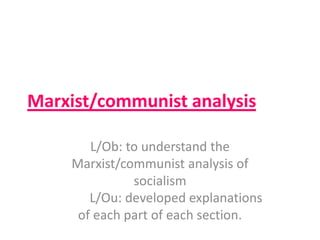
Marxist and communist analysis
- 1. Marxist/communist analysis L/Ob: to understand the Marxist/communist analysis of socialism L/Ou: developed explanations of each part of each section.
- 2. Task 2:Fundamentalist socialism Marxist/communist analysis; •historical materialism ('base/superstructure'; scientific theory of history/society); •dialectical change (internal contradictions in society; historical inevitability); •class analysis (class conflict as •We have already touched on various parts of Marxism/Communism. •Your task is to produce a presentation, explaining all of these points in detail. •You need to be able to explain what these concepts are to the others in the group. •You will therefore need to research these ideas, through reading the book or elsewhere. •Then you need to add this information into a presentation. •Your presentation needs to be detailed but also thorough- see hand out for guidance.
- 3. Historical materialism ('base/superstructure'; scientific theory of history/society) •Marx conducted a scientific analysis of different societies over time.
- 4. Dialectical change (internal contradictions in society; historical inevitability) •There have always been conflict between groups in society- long struggle between the oppressed vs. the oppressor etc… •4 stages of history (e.g. primitive communism, feudalism etc. when this happened) •Marx believed this would
- 5. Class analysis (class conflict as motor of history; surplus value; class consciousness)•Alienation- workers are separated from the product of their work, the process of their work, their fellow workers and themselves. •Class conflict as motor of history: He defined class in terms of economic power- specifically “where people stand with relation to the means of production”. Two great classes facing each other…“The history of all hitherto societies is the history of class struggle”- classes are the agents of change. •Surplus value- in order to make profit, need to pay workers less than the value of what they’re making. This would lead to more being produced than could be bought and inevitably lead to poverty/unemployment in w/class and conditions in which they would revolt. •Class consciousness- Where the working class gains awareness of the conditions and interests of itself and has willingness to pursue them. This would potentially be created by the cyclical nature of capitalism mentioned above and lead to a revolution.
- 6. Stages of history; collapse of capitalism (proletarian revolution); transition from capitalism to communism (dictatorship of proletariat; 'withering away' of state) •The collapse of capitalism would occur when the forces of production had expanded to the limits capitalism would allow. •However, a proletarian revolution would only occur if the subjective conditions of the proletariat becoming “class conscious” occurred as well. •Once the bourgeoisie had been removed, the transition from capitalism to communism would be led by a temporary “dictatorship of the proletariat” to ensure the gains of the revolution were safeguarded. •Once they were in place they could oversee the transition to full communism and then once this was complete the state would “wither away”.
- 7. Nature of communism (politics of ownership; abolition of private property/capitalism; absolute equality) •politics of ownership; no private ownership or free markets. Private ownership keeps capitalism going and should be abolished. •abolition of private property/capitalism; Private ownership creates greed/materialism, antagonises workers through not sharing wealth. •absolute equality; They believe in equality between all through a classless society, egalitarianism- equality of outcome.
- 8. 20th-century communism (vanguard party; state collectivisation; central planning). •Bolsheviks in Russian revolution- became Communist party. •Spread to other countries through first half of 20th Century. Leadership from Moscow and based on Soviet Communism. •Based heavily on interpretations of Marxist theory by two leaders; Lenin and Stalin. •Russian revolution was different to how Marx had envisaged. Did not take place in westernised countries like UK etc., but in mainly rural countries like Russia/China with small urban proletariat. •Lenin claimed hard for proletariat to understand and move into full class consciousness without aid of individuals with intellectual knowledge of Marxist theory. •Central feature of Leninism was- he proposed the need for “Vanguard party” who could be “armed with Marxism” to “awaken the proletariat to its revolutionary potential”. •Lenin proposed need for Vanguard party to be organised by principles of “Democratic centralisation”- a supposed balance between freedom of discussion and strict unity of action.
- 9. The Bolsheviks- a vanguard party •Took power in 1917 as a vanguard party. •If they were acting on behalf of the proletariat as class struggle in inevitable. •It order for communism to be achieved, need for dictatorship of proletariat to maintain gains of revolution and suppress
- 10. Stalinism •Stalin was another heavy influence on Soviet Union. •Dramatic political and economic upheaval- 5 year plans brought rapid industrialisation, eradication of private enterprise, and the collectivisation of agriculture. Millions of peasant had to give up their land and work for state farms. •Economic Stalinism was “state
- 11. Homework for socialism: •Why do socialists support collectivism and how have they done it? (15 marks) •Why did Marx believe that capitalism was doomed to collapse? (15 marks) •Why did socialists believe in gradualism and why has gradualism failed? (45 marks) • To what extent have socialists favoured the common ownership of wealth? (45 marks) (Summer 2012)